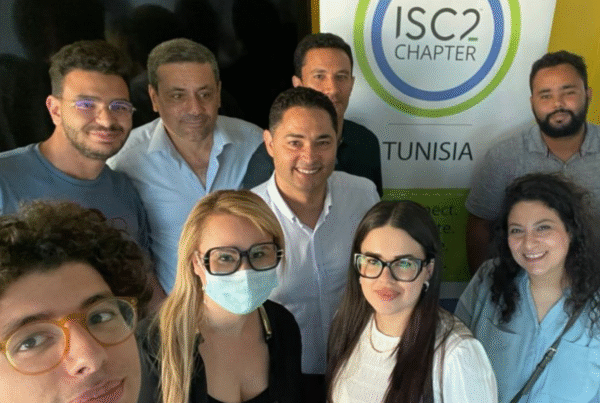Each day, we rely on technology to connect, inform, and protect us. Yet, as we embrace these advancements, we also confront a multitude of ethical dilemmas and community challenges. I recently attended the OWASP Global AppSec Dublin 2023 conference, where I was reminded of the profound impact that collaboration and community engagement can have on our profession. But this experience also led me to reflect on the darker side of technological advancement, as depicted in the series Black Mirror. It is crucial that we navigate these complexities with both a commitment to community-building and a dedication to ethical practices. In this opinion piece, I will explore the interplay between these elements and argue for the necessity of a balanced approach in cybersecurity.
The Importance of Community in Cybersecurity
Community is not just a buzzword in the cybersecurity field; it is the backbone that supports our efforts to create a safer digital environment. My experience at the OWASP Global AppSec Dublin conference underscored this notion. I witnessed firsthand how professionals from diverse backgrounds came together to share insights, foster innovation, and strengthen security practices. The power of collective knowledge cannot be overstated.
At events like this, we exchange ideas, learn from each other’s experiences, and build relationships that extend beyond the conference walls. It is during these interactions—informal conversations over coffee or collaborative problem-solving sessions—that we cultivate a culture of security. This camaraderie is essential, especially when considering that cybersecurity is not solely about technology; it is fundamentally about people.
Moreover, inclusivity plays a pivotal role in enhancing our community. At the conference, I was inspired by initiatives aimed at making complex concepts accessible to all, regardless of their technical background. This inclusivity is vital for attracting diverse talent to our field. With an estimated 3.4 million unfilled cybersecurity positions globally, we must strive to create environments where individuals from all walks of life can contribute to our collective mission. By embracing diversity, we not only enrich our conversations but also fortify our defenses against emerging threats.
In my view, community-building is not just beneficial; it is essential for the future of cybersecurity. As we face increasingly sophisticated challenges, the strength of our community will determine our ability to innovate, adapt, and respond effectively.
Ethical Considerations in the Age of Technology
The Dangers of Technological Advancement
As we race forward in the digital age, it is crucial to pause and reflect on the ethical implications of our technological advancements. Every innovation, while promising, carries potential risks that can have far-reaching effects on individuals and society at large. The series Black Mirror serves as a powerful reminder of this reality. Each episode presents scenarios that, although fictional, provoke critical thoughts about the consequences of our reliance on technology. They challenge us to consider how our digital tools can distort values and shape behaviors in ways we may not fully comprehend.
Take, for instance, the episode “Nosedive,” which explores the implications of a social-credit system dictating personal and professional opportunities based on online reputation. This narrative sheds light on a present-day reality where social media platforms can dictate our societal standing. It raises profound questions about fairness and transparency—how algorithms, often cloaked in secrecy, can determine our access to resources and opportunities. As we embrace technology, we must remain vigilant about its potential to reinforce biases and contribute to societal fragmentation.
Urgent Need for Robust Cybersecurity Measures
Moreover, as depicted in Black Mirror, the consequences of data breaches and misuse of technology are not mere fiction. These stories resonate with the stark realities we face today. The rise in ransomware attacks, marked by a staggering 150% increase in 2022, highlights the urgency of implementing robust cybersecurity measures. Such threats can lead to significant financial losses and compromise sensitive information, putting individuals and organizations at risk. It is imperative that we prioritize cybersecurity not just as a technical challenge, but as an ethical obligation to protect individuals’ safety and privacy.
To effectively combat these threats, organizations must adopt a proactive approach to cybersecurity, integrating ethical considerations into their strategies. This means not only investing in the latest technologies but also fostering a culture of security awareness among employees. Ethical practices should guide our responses to incidents and shape our preventive measures. We must recognize that cybersecurity is not just about responding to threats; it’s about building trust with our users and ensuring their data is safeguarded against misuse.
Advocacy for Stronger Regulations
In light of these ethical dilemmas, the call for stronger regulations becomes even more pressing. As cybersecurity professionals, we have a responsibility to advocate for policies that protect individuals from the negative consequences of technological advancements. The General Data Protection Regulation (GDPR), which took effect in 2018, is an exemplary piece of legislation that mandates organizations to uphold stringent security measures and maintain transparency regarding data usage. This not only sets a standard for data protection but also empowers individuals by giving them more control over their information.
We must strive for similar regulations that hold organizations accountable for their practices. It is crucial to engage in dialogue with policymakers, share insights from our field experiences, and advocate for frameworks that prioritize ethical considerations in technology development. By doing so, we can help shape a landscape where technology serves humanity rather than endangers it. The responsibility to protect our digital future lies not just in our hands but in the collective effort of our community to demand higher standards.
The Dual Imperative: Building Community and Fostering Ethical Practices
Ultimately, the challenges we face in cybersecurity demand a dual approach—one that embraces community-building and emphasizes ethical practices. As I reflect on my experiences at the OWASP Global AppSec Dublin conference, I am more convinced than ever that our collective efforts can pave the way for a safer digital landscape. By fostering inclusive communities that prioritize collaboration and diversity, we can enhance our resilience against emerging threats. Simultaneously, we must remain vigilant in addressing the ethical implications of our technological advancements.
Navigating the complexities of the digital world requires a commitment to both community engagement and ethical responsibility. As cybersecurity professionals, we are not merely gatekeepers of technology; we are stewards of its ethical use. By championing strong regulations and fostering a culture of security, we can ensure that our innovations serve to protect and empower individuals. The time for action is now, and it is up to us to lead the charge in creating a more secure and ethical digital future.
The Dangers of Technological Advancement
As we embrace new technologies, we must also confront the potential dangers they bring. The rapid evolution of digital tools has outpaced our ability to regulate and understand their implications. This disconnect often leads to vulnerabilities that can be exploited by malicious actors. In my reflections on the Black Mirror series, I am reminded that our relentless pursuit of advancement can sometimes blind us to the ethical dilemmas these developments present.
Some specific dangers include:
-
-
- Data Breaches: The proliferation of interconnected devices increases the likelihood of data breaches, revealing sensitive information that can be used for identity theft or corporate espionage.
-
- Manipulation and Control: Technologies such as social credit systems and algorithm-driven content can manipulate public opinion and individual behavior, leading to societal consequences that may be difficult to reverse.
- Increased Attack Surface: Each new device or application added to a network can serve as a potential entry point for cybercriminals, expanding the attack surface and complicating defense strategies.
-
These scenarios illustrate just a few of the ethical implications of technological advances. They emphasize the urgent need for robust regulatory frameworks that prioritize user privacy and protection. Without these safeguards, we risk creating an environment where the consequences of our innovations outweigh their benefits. As cybersecurity professionals, we bear the responsibility to advocate for practices that ensure technology serves humanity, rather than endangers it.
In an age where ransomware attacks surged by over 150% in 2022 alone, we must remain vigilant. We cannot afford to underestimate the consequences that stem from our reliance on technology. The stories depicted in Black Mirror serve as cautionary tales, urging us to consider the ethical ramifications of our choices. By highlighting these potential dangers, I hope to encourage more thoughtful discussions about how we can navigate our digital landscape responsibly.
Urgent Need for Robust Cybersecurity Measures
As I reflect on the current landscape of cybersecurity, it is clear that we are facing an urgent need for robust measures to protect our data and privacy. The statistics are alarming. Ransomware attacks surged by over 150% in 2022, causing significant financial losses across various sectors. This escalation serves as a stark reminder that the threats we encounter are not merely theoretical; they are real and pervasive. Without decisive action, we risk jeopardizing not only organizational stability but also individual safety and privacy.
To address these challenges, I believe we must prioritize several key strategies:
-
-
- Comprehensive Risk Assessments: Organizations should routinely conduct thorough risk assessments to identify vulnerabilities. Understanding where weaknesses lie allows for targeted interventions that can mitigate potential threats before they escalate.
-
- Investment in Advanced Technologies: Embracing cutting-edge technologies such as AI-driven security solutions can significantly enhance our defenses. These tools can help in real-time threat detection, enabling us to respond swiftly to potential breaches.
-
- Continuous Training and Awareness Programs: Cybersecurity is a constantly evolving field, and so too must our knowledge and skills. Regular training for employees not only raises awareness about potential threats but also cultivates a culture of vigilance and preparedness.
- Collaboration Across Sectors: A collaborative approach that shares intelligence and best practices among organizations can fortify our defenses. By learning from each other’s experiences, we can develop strategies that are not only reactive but also proactive in nature.
-
In light of these strategies, it is imperative that we shift our mindset from viewing cybersecurity as merely a compliance issue to recognizing it as a critical component of our operational integrity. The reality is that a single data breach can have far-reaching consequences, not just for the organization involved but for the individuals whose information is compromised. The stakes are high, and we must act accordingly.
To effectively combat the rising tide of cyber threats, I urge my colleagues and fellow industry professionals to advocate for stronger policies and practices that prioritize cybersecurity. We must not only implement robust measures but also engage in ongoing dialogues with policymakers to push for regulations that safeguard our digital environments. As we continue to navigate the complexities of technology, let us remain steadfast in our commitment to protecting our communities and respecting the ethical implications of our choices. The time for action is now.
Advocacy for Stronger Regulations
In my view, the urgent need for stronger regulations in the realm of cybersecurity cannot be overstated. As we navigate a digital landscape rife with vulnerabilities, it is imperative that we advocate for comprehensive policies that protect individuals and organizations alike. The lessons learned from recent high-profile data breaches and cyberattacks highlight the consequences of insufficient regulatory frameworks. When organizations are left to self-regulate, it often results in inconsistent practices that jeopardize the security of sensitive data. Regulatory oversight can ensure that all entities adhere to a baseline of security standards, which is essential for building a resilient digital ecosystem.
One of the most significant advancements in this area has been the introduction of the General Data Protection Regulation (GDPR) in the European Union. This landmark legislation has set a precedent for data protection laws worldwide, mandating organizations to implement stringent security measures and remain transparent about their data usage. However, while GDPR is a commendable step forward, we must recognize that it is not a panacea. Regulatory frameworks must evolve continuously to keep pace with the rapidly changing technological landscape. As cybersecurity professionals, we should actively participate in discussions around regulatory reforms and contribute our insights to shape future legislation that addresses emerging threats.
Furthermore, we have a responsibility to educate businesses about the importance of compliance with these regulations. Many organizations, especially small to medium-sized enterprises, may not fully understand the implications of non-compliance. It is essential to foster an environment where organizations see compliance not merely as a legal obligation but as a critical component of their overall cybersecurity strategy. By providing support and resources, we can empower businesses to prioritize security measures that align with regulatory requirements. In doing so, we enhance not only their resilience but also that of the entire community.
Finally, as advocates for stronger regulations, we must champion a collaborative approach involving government agencies, private sector entities, and civil society. Creating a shared understanding of cybersecurity risks and responsibilities will lead to more effective regulations and better security outcomes for everyone. By working together to establish a unified stance on cybersecurity challenges, we can effect meaningful change that protects individuals and organizations in our interconnected world. The time for action is now, and we must seize the opportunity to strengthen our regulatory frameworks for a safer digital future.
The Dual Imperative: Building Community and Fostering Ethical Practices
Embracing a Holistic Approach
As I reflect on the dual imperative of community engagement and ethical practices in cybersecurity, I am reminded that these elements are not mutually exclusive; they are intertwined threads of the same fabric. Building a robust community is essential for fostering dialogue around ethical considerations that affect us all. When we come together, we can raise awareness about ethical dilemmas and collectively brainstorm solutions that respect and protect individual privacy. Open discussions promote transparency, making it easier to identify potential risks associated with new technologies.
Learning from Each Other’s Experiences
In my experience, sharing knowledge and lessons learned within a community can illuminate the path forward in addressing ethical challenges. For instance, at the OWASP Global AppSec Dublin conference, I noticed how experts were more than willing to share both their triumphs and their failures. It is through these candid conversations that we can identify best practices and develop a framework for ethical decision-making in cybersecurity. When we create an environment where vulnerability is welcomed, we empower each other to tackle pressing ethical issues head-on.
The Role of Collaboration in Policy Advocacy
Community engagement also paves the way for effective advocacy for stronger regulations. As cybersecurity professionals, we have a responsibility to not only protect data but to also champion ethical practices that protect individuals from exploitation. By collaborating with one another, we can amplify our voices in discussions about regulatory reforms that prioritize privacy and security. It is our collective knowledge and experience that can inform policymakers, leading to the development of robust standards that safeguard against the potential abuses of technology.
Strengthening the Resilience of Our Community
Moreover, fostering a strong community enhances our resilience against emerging threats. In an era where cyberattacks are becoming increasingly sophisticated, our collective strength serves as a formidable defense. When we unite our expertise and resources, we are better equipped to identify vulnerabilities, share threat intelligence, and develop comprehensive strategies that align with ethical standards. This not only protects our organizations but also enhances public trust in our ability to manage cybersecurity challenges responsibly.
A Call to Action
Ultimately, the dual imperative of community-building and ethical practices demands our attention and action. As cybersecurity professionals, we must prioritize creating inclusive spaces that encourage collaboration and ethical discussions. By integrating these principles into our daily practices, we can ensure that technology serves humanity and not the other way around. I invite my peers to join me in this endeavor, as together, we can create a safer, more ethical digital landscape for everyone. The time to act is now, and the strength of our community is our most powerful weapon against the challenges that lie ahead.
Conclusion
As I reflect on the themes presented throughout this piece, I am reminded of the dual nature of our technological world. Community and ethical considerations must go hand in hand as we navigate the complexities of cybersecurity. The insights gained from the OWASP Global AppSec Dublin conference reaffirmed my belief that collaboration is not only a valuable resource but a necessity. When we unite our diverse experiences and perspectives, we create a formidable front against the multifaceted threats we face.
Simultaneously, I cannot ignore the pressing ethical implications of our advancements. As we rush to innovate, we must pause and consider the consequences of our creations, ensuring they serve humanity rather than detract from it. The potential dangers, vividly illustrated in narratives like Black Mirror, serve as cautionary tales of what can occur when ethical foresight is absent.
In this rapidly changing landscape, the urgency for robust cybersecurity measures cannot be overstated. Stronger regulations and a commitment to ethical practices are non-negotiable for safeguarding both our technological advancements and the communities they impact.
In essence, we stand at a crossroads. By prioritizing community-building alongside ethical considerations, we can foster a cybersecurity environment that is not only effective but also inclusive and responsible. The road ahead may be fraught with challenges, but I am confident that with a united front, we can navigate it wisely and create a safer digital future for all.







